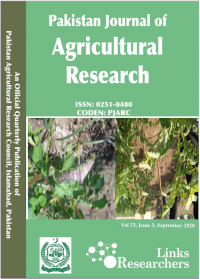Evaluating the Environmental Impacts of Fluoride on the Growth and Physiology of Cotton (Gossypium hirsutum)
Evaluating the Environmental Impacts of Fluoride on the Growth and Physiology of Cotton (Gossypium hirsutum)
Muhammad Nawaz1*, Muhammad Dawood1, Kainat Javaid1, Muhammad Imran2, Fengliang Zhao3, Shahzadi Saima4 and Syed Tansir Hussain Shah2
ABSTRACT
Environmental pollutants are considered harmful not only to humans but to flora and fauna. Fluoride present in the soil, water or even in the atmosphere may adversely affect plants and ultimately cause serious negative consequences on the development, growth and maturity of crops. In this regard, this study was conducted to examine the possible health effect of fluoride pollution in the form of sodium fluoride on the growth and physiological parameters of cotton plant. The cotton plants were grown in the pots. Six different concentrations of fluoride (3mg/L to 15mg/L) along with water as control were used periodically. At both harvests, maximum growth and physiological functions were recorded at 0mg/L treatment while, reduction was recorded at 15mg/L.
To share on other social networks, click on any share button. What are these?






